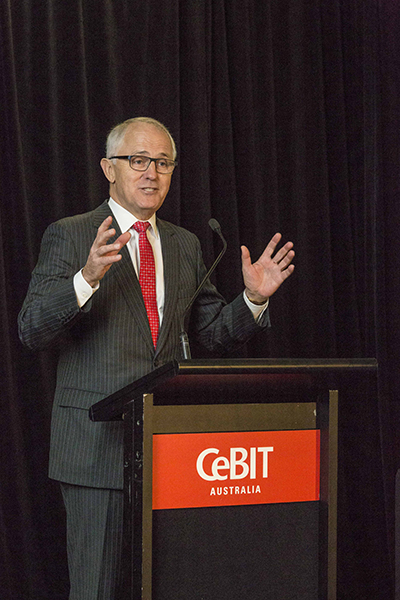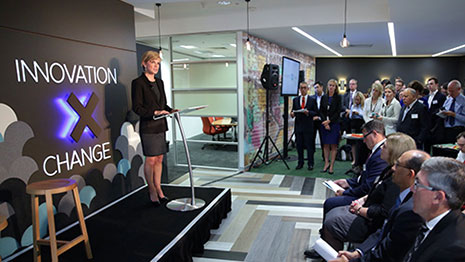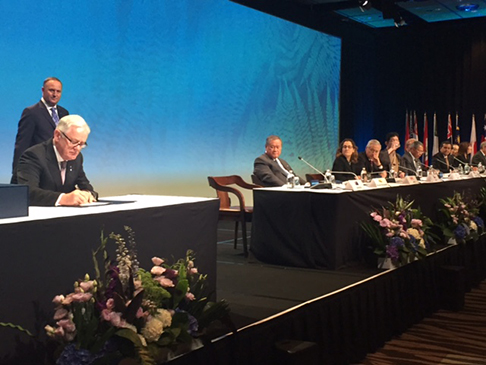Prime Minister launches NISA approach to innovation agenda
EXTRA >> By Mike Sullivan
RARELY has a Federal Government initiative been so well received as the National Innovation and Science Agenda (NISA).
Sure, it had a master salesman with an anticipant presence: Prime Minister Malcolm Turnbull. And, sure, business leaders – especially those at the innovative leading edge – have been calling for many reforms that were announced in the package for several years. 
The fact that so many of those reforms, to assist businesses trying to innovate, have been written into the package is surprising enough – but the fact that several other announcements had an innovative edge about them was a major surprise.
Australian business is not used to that. It is used to moribund governments who make decisions based on short-term electoral concerns. Governments that will not admit when something is not working and, so, change it.
Initially, it is about changing the mood of Australian business from sombre and weary to imaginative and energetic. In that respect, NISA is a nicer start.
The fact that the announcement was made at CSIRO headquarters in Canberra shows a deft touch.
Mr Turnbull has to paint a big inspirational picture – “our innovation agenda is going to help create the modern, dynamic, 21st-century economy Australia needs” – but must draw in multi-various elements of detail for success.
He has drafted a landscape that features subjects as diverse as new finance systems, immigration, education, R&D, regulatory and taxation innovation. And he stretched the canvas symbolically, and politically, by re-instating and re-organising funding to the CSIRO that had been removed under previous Prime Minister Tony Abbott – and making that announcement at the CSIRO headquarters.
INNOVATIVE LANGUAGE
The Prime Minister Turnbull couched what is a complex shift in the Australian business environment in simple terms. He called it “ushering in the ideas boom”.
With his introduction of the National Innovation and Science Agenda (NISA) Mr Turnbull also drew a line under the mining construction boom that has advantaged and elevated Australia’s fiscal security for more than a decade. The thing about drawing a line under an era is that you now have a choice: look above the line or below it.
The challenge for Mr Turnbull is to keep challenging Australian business leaders to peer long and hard high above that line – business leaders that are used to being disappointed
Through the new innovation agenda, Mr Turnbull is clearly urging Australian business leaders to look way above the line for what will underpin the country’s prosperity well into the future: ideas and effort. While these qualities have always underpinned Australia’s leading industries – and will continue to do so in mining, where mining services technologies and know-how have become one of Australia’s great exports – in the digital age they need to drive all industries.
“That is the next boom for Australia and, you know something, unlike a mining boom, it is a boom that can continue for ever,” Mr Turnbull said. “It is limited only by our imagination and I know that Australians believe in themselves, I know that we are a creative and imaginative nation and inspired, led, incentivised, we will have a very long ideas boom in the 21st-century.”
The problem with ‘industrialising’ ideas is that it is extremely complicated. There are lots of good ideas, but getting them to become good commercial ideas that create jobs and wealth is where Australia has fallen down regularly in the past.
Australian ‘ideas men and women’ created the refrigeration of food, the world’s first feature film, the black box flight recorder, wi-fi and, arguably, the technology behind controlled flight. But how many of those ideas are now commercially dominated by Australian firms?
Americans the Wright Brothers made the first powered flight utilising systems they acknowledged were created by Australian Lawrence Hargrave. Today, America has Boeing, Lockheed and, lately, SpaceX. Australia had the Commonwealth Aircraft Corporation, now owned by Boeing.
Americans created the Internet and sent it mobile through wireless fidelity (wi-fi). Australians developed wi-fi through the CSIRO. Americans today have Google, Apple, and Facebook. Australia has some great second and third tier internet-based companies – most of which have had to go to the US to be funded – and to scale up.
THE VISION
“Although there are challenges, there has never been a better time to start and grow a business from Australia, which can now compete for customers located anywhere in the world,” Mr Turnbull said at the launch in Canberra.
“We are on the doorstep of Asia, the world’s economic engine room and our new trade agreements with China, Japan and Korea are opening up more doors in Asia for our business,” he said, elevating the public perception of those trade agreements won by Mr Abbott.
“The internet and the technologies it enables mean we are now part of a truly global marketplace. It means there are fewer barriers to entry for Australian businesses, no matter where they are located, right across Australia they can sell their products and services to just about every corner of the globe.”
THE STARTING POINT
To figure out where you are going, you have to know where you are at. This has been a delusional problem for Australia in recent years, where many government initiatives have happily called themselves “world class”. This has often been wishful thinking.
The Prime Minister did draw a line in the sand about where Australia was beached on innovation and where it had its toes in the water.
“Our universities, our research organisations like the CSIRO, where we are today and our workforce are world-class but, Australia is falling behind when it comes to commercialising good ideas and collaborating with industry,” he said.
“Australia consistently ranks last or second last among OECD countries for business research collaboration. Increasing collaboration between businesses, universities and the research sector is absolutely critical for our businesses to remain competitive.
“To commercialise an idea, a great invention, a great innovation, a great piece of research and then grow it into new sources of revenue, new jobs, new opportunities and new industries.
“Companies that embrace innovation, that are agile and prepared to approach change confidently and with a sense of optimism are more competitive, more able to grow market share and more likely to increase their employment. More jobs, more growth – that is the focus of my government.
“And, we are absolutely committed to ensuring that our students have the skills to find high wage and rewarding jobs, regardless of their qualifications or career path. We are going to do this by promoting coding and computing in schools, to ensure our students have the problem-solving and critical reasoning skills for the jobs of the future.
“We cannot future-proof ourselves from change, nor should we seek to do so. But, we can ensure that our students are graduating with the skills and the agility to identify opportunities and embrace risk.”
The Prime Minister outlined how the agenda was organised: “The government’s innovation package that we are releasing today will incentivise and reward innovation, entrepreneurship and risk-taking by focusing on four key areas.”
1: CULTURE AND CAPITAL
Mr Turnbull said changing the business culture and capital systems would help Australian business to embrace risk and incentivise early stage investment in start-ups.
“You will see in this package there will be new incentives, new drivers to ensure that Australians with new business ideas, with new enterprises will be better able to find the capital that gets them started,” he said. “And, you know something? Even if their businesses don't succeed, we all benefit. We learned so much from the failure of new businesses.
“We want to be a culture, a national culture of innovation, of risk-taking, because as we do that, we grow the whole ecosystem of innovation right across the economy. It is believing in our human capital and remembering that the best assets we have, the most important assets we have in this country are not to be found under the ground, but walking around on top of it is the 24 million Australians, the men and women of Australia, these and their ideas are what secures our future. And, this package will incentivise, dynamise, energise that enormous opportunity.”
2: BUSINESS RESEARCH COLLABORATION
The government is restructuring to help drive business research collaboration, Mr Turnbull said. “ensuring that there is greater collaboration between organisations like the CSIRO, universities, other research institutions and business to commercialise ideas and solve problems”.
Mr Turnbull said NISA was designed to encourage “every single business, large or small to be more innovative, to be more prepared to have a go at something new because in the world of the 21st-century, in 2015, that is how you prosper”.
3: TALENT AND SKILLS
The emphasis needed to be on training and preparing Australians for the jobs of the future, Mr Turnbull said.
“We are going to focus on talent and skills, training our students for the jobs of the future and ensuring that we attract the world's best innovative talent to Australia,” he said.
“I said that our best assets are walking around on top of the earth, you know something, so are everybody else’s and we want to have the best talent come to Australia, whether they come to Australia for the first time, or whether they are a foreign student that has done postgraduate work here and wants to stay here and develop new businesses, contribute to the innovative economy of Australia.
“We want to make sure we retain and gain the best human capital that we can.”
4: GOVERNMENT TECH LEAD
A bold shift by Mr Turnbull was announced as the fourth pillar of the innovation strategy: “government leading by example in the way it invests in and uses technology”
This aim is for both economic advantage and to give Australia’s leading technology companies a ‘home ground advantage’. Governments around Australia have been widely criticised for being slow to adopt useful new technologies and for dis-favouring Australian technology leadership and favouring multi-national brands.
“Right across the board you will see there are measures to ensure that government is digitally transformed, so that it is nimble, so that you can deal with government as easily as you can with eBay or with one of the big financial institutions,” Mr Turnbull said. “We should be able to transact with government for most of our engagement on our smartphone.
“Digital works, it transforms, it makes it easier for business, easier for government.
“The other thing that we must do is ensure that we embrace small business and you will see here measures that are going to make it much easier for smaller Australian businesses to sell to government and for government to buy from them,” Mr Turnbull said.
“There have been too many barriers, it has been too hard, too much red tape, too many forms. We can sweep that aside. In 2015, we don’t need that. We need to work swiftly and nimbly and government has to lead the way.
“This is the opportunity of the 21st-century. This is a century of ideas, this is a time when Australia’s growth, when our living standards, when our incomes will be determined by the human capital, the intellectual capital that all of us have.
“By unleashing our innovation, unleashing our imagination, being prepared to embrace change, we usher in the ideas boom.”
But while highlighting the vision, Mr Turnbull has flavoured it with a practicality that is rare: the government is prepared to ‘fail fast’ in its initiatives as well.
“We have got to be prepared to take risks. That is why one of the aspects of the political paradigm I’m seeking to change is the old politics where politicians felt that they had to guarantee that every policy would work, they had water everything down so there was no element of risk,” Mr Turnbull said. “Let me tell you: I’m not guaranteeing that all of these policies will be as successful as we hope they will be.
“Actually, I'm very confident about it because we've worked very hard on it. We had a great team, a lot of good collaboration, but if some of these policies are not as successful as we like, we will change them. We will learn from them.
“Because that is what a 21st century government has got to be. It has got to be as agile as the start-up businesses it seeks to inspire.”
www.innovation.gov.au
ends

 How to resolve AdBlock issue?
How to resolve AdBlock issue? 




